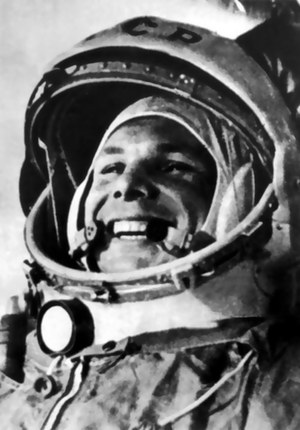Gagarin’s flight and the Cold Warby Taylor Dinerman
|
| What the Russians call “cosmonautics” still holds an important place in their national imagination. |
Besides beating Napoleon and Hitler’s invading armies, beating the US into space is one of the few unambiguously and indisputably positive things that Russia’s government can brag about. Russian individuals have made fantastic contributions in fields such as music and literature, but most often they have done so either without state support or in direct opposition to the state. The launches of Sputnik and Gagarin were accomplished by the Russian state. Just as Russia’s victories over revolutionary France and Nazi Germany were military victories, so Sputnik and Gargarin were also military victories. It’s just that they were military victories of a new and nonviolent kind.
In his 1971 memoir, Soviet leader Nikita Khrushchev wrote, “Our potential enemy—our most powerful, our most dangerous enemy—was so far away from us that we couldn’t have reached him with our air force. Only by building up a nuclear missile force could we keep the enemy from unleashing war against us… But we were the first to launch rockets into space; we exploded the most powerful nuclear devices; we accomplished those feats first, ahead of the United States, England and France.” Since this was published historians have gained a better understanding of what was happening during those years, but to this day Khrushchev’s basic message is probably accepted by a majority of Russians and it certainly is what the men in Kremlin want their people to believe.
What the Russians call “cosmonautics” still holds an important place in their national imagination. It was one of the things they were determined to preserve after the fall of the Soviet Union in 1991. The government in Moscow went to extraordinary lengths to insure that the skills, organizations, and industry that were responsible for Gagarin’s success were kept intact as an important economic and cultural asset. Russia’s space leaders showed just how far they were willing to go when, in 2001, they agreed to launch Dennis Tito into orbit, making him the first “space tourist”.
Since then Russia has taken full advantage of the Soviet space heritage to build up a profitable niche for themselves launching American- and European-built commercial satellites. They have so far withstood serious competition from the Ariane series of launchers, and although it remains to be seen if they can compete with the new SpaceX Falcon rockets, they are certain to try.
Boris Chertok’s extraordinary set of memoirs Rockets and People, published by NASA and edited by Asif Siddiqi, explains that, “The flight of the first human being into space, and the success of Soviet science and technology served to unite spiritually all social strata.” Obviously that sense of spiritual unification still exists after fifty years and it explains why Russia, no matter what happens, is determined to remain a major space power.
| Yet the elements that came together to fire up humankind’s first effort to reach into outer space have not disappeared: national pride, scientific curiosity, technological ambition, and the desire of a small number of visionaries to create a civilization on other worlds my someday come together again. |
Chretok also writes, “I contend that if Gagarin’s flight on April 12th 1961 had ended in failure, U.S. astronaut Neil A. Armstrong would not have landed on the Moon on July 20th 1969.” He may be right, but perhaps not the way he thinks. The Moon race and the human spaceflight programs of the USSR and the US did not take away resources that would otherwise have gone into military systems. That is certainly not in the case of the US where the space shuttle, for example, only survived attempts to cancel it during the Carter Administration because the president was convinced it was needed to launch spy satellites. For most of the half century since Gagarin’s flight it has been, on the whole, easier to get funding for national defense programs than for NASA.
Tom Wolfe, of course, said it best in The Right Stuff: “The ‘Space Race’ became a fateful test and presage of the entire Cold War conflict between the ‘superpowers’, the Soviet Union and the United States. Surveys showed that people throughout the world looked upon the competition in that fashion, i.e. as a preliminary contest proving final and irresistible power to destroy… But in these neo-superstitious times it came to dramatize much more than that. It dramatized the entire technological and intellectual capability of the two nations and the strengths of national wills and spirits.”
Since the 1960s nothing like that “race” has existed. It may be that it was all just an artifact of the times, like bell bottoms or hippies or geodesic domes. Yet the elements that came together to fire up humankind’s first effort to reach into outer space have not disappeared: national pride, scientific curiosity, technological ambition, and the desire of a small number of visionaries to create a civilization on other worlds may someday come together again and set off a future push out into the solar system.
